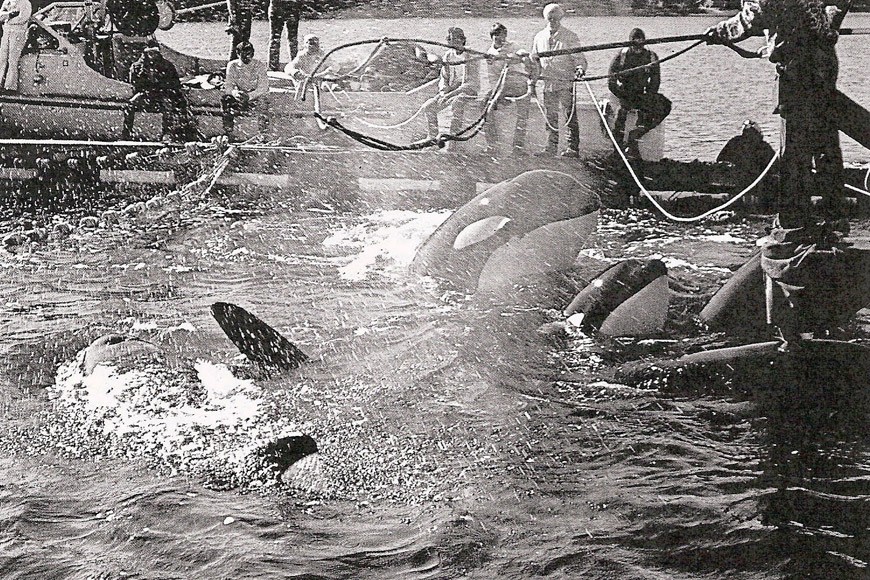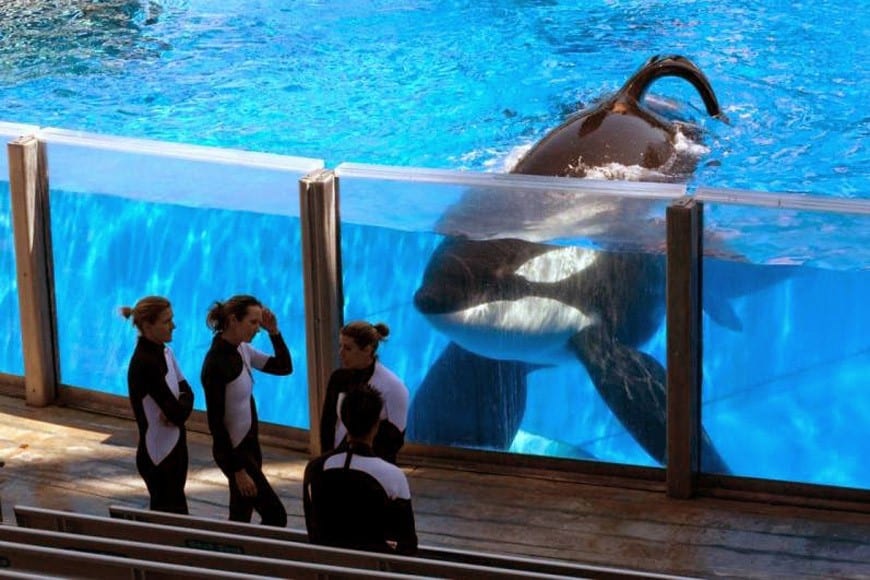Most of us can remember the first time we saw a whale breach water—too young to question why the gigantic creature was in a tank rather than the ocean. Orcas and other marine mammals have entertained the public at amusement parks like SeaWorld and Marineland for over a half a century. The name Shamu conjures visions of a happy Orca performing amazing feats with athletic trainers for tasty little treats. But while audiences cheer for these larger than life creatures show after show, a much more sinister story is unfolding behind closed doors. Blackfish, a documentary detailing the horrors of Orcas in captivity has aimed to enlighten the public on the situations of whales at SeaWorld and similar amusement parks.
Unlike many animals in the wild, Orcas live in original family units for their entire lives and are negatively impacted when fishermen, hired by amusement parks, take calves from their mothers.
Sealand of the Pacific, less of an amusement park and more of a large swimming pool with three holding tanks which barely allowed the whales to move was one of the amusement parks to employ fishermen to harvest whales. The amusement park was forced to shut down after one whale attacked a trainer. The whale was sold to SeaWorld Orlando, where it has attacked three more trainers, and continues to perform daily as Shamu.
Aside from the methods used for training, Orcas in captivity face many other hardships including but not limited to dorsal fin collapse, which according to Free Tilly Now, exists in 100 percent of male Orcas held in captivity. Marine mammals held by SeaWorld also experience shorter life spans, and psychological and emotional distress.
While the circumstances for captive Orcas are bleak, the inhumane treatment of these majestic animals does occur in some open waters and extends to other marine mammals including dolphins, porpoises and other whale species.
Off the coast of Japan, hunters herd and kill dozens of bottlenose dolphins and porpoises annually. Japanese hunters are also granted permission to kill thousands of whale species including the mink, humpback and fin variety.
While marine mammals in captivity and the waters off of Japan’s coast face cruel and inhumane treatment, their counterparts in Indian waters just caught a break. India recently declared dolphins, whales, and porpoises as “non-human persons” who have a right to life and liberty that must be respected. The legislation forces dolphin parks that were being built across the country to close. While this new law only currently pertains to dolphins, it is a step in the right direction toward preserving natural marine life.
India’s recent political move is one way to help ensure the proper treatment of marine mammals but more can be done on the individual, local level.
Three simple steps to promote the welfare of Orcas and Dolphins:
1. Boycott amusement parks that use marine mammals
Where you put your money is a statement. By choosing not to buy tickets to SeaWorld or other amusement parks who use marine mammals for entertainment purposes, you are saying that you do not support what they do. If enough people refuse to buy tickets to SeaWorld, the park will be forced to discontinue its use of Orcas and dolphins as performers, or at the very least make changes to the way its animals are treated.
2. Support organizations in line with your views
There are lots of anti-captivity groups out there, many of which have increased in popularity and have become more familiar to the public in the wake of Blackfish. Organizations like the Whale and Dolphin Conservation, the Animal Welfare Institute and Keep Whales Wild work to improve the living conditions of captive marine mammals in the short term and ensure the release of the animals in the long-term. You can get involved by becoming a member, donating money or volunteering.
3. Make the public aware
Many people don’t help or continue to support amusement parks that use marine mammals as performers because they aren’t aware of the issues surrounding this crisis. You can start small by enlightening your family and friends and encouraging them to take a stand. If you want to go big, join a protest. Not only will this increase the amount of people you reach, but it will help attract the media. If it doesn’t make national news, it will surely make the local news.
Orcas, dolphins, and porpoises are smart, social and majestic creatures who deserve to live their lives to capacity. This can’t be accomplished in captivity where their life is summed up to daily performances and large swimming pool to live in. The increase in public awareness and concern is the first step in ensuring that marine mammals are allowed to live peacefully in open waters.
Related Article: Marine Activist, Ocean Ramsey, Fight the War on Sharks


